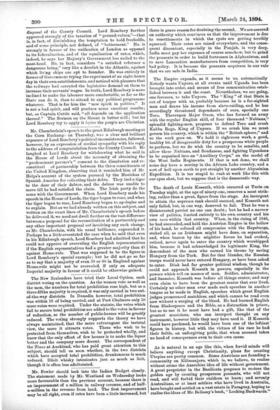The death of Louis Kossuth, which occurred at Turin on
Tuesday night, at the age of ninety-one, removes a most strik- ing, rather than a great, figure from the stage. An insurgent to attain the supreme rank should succeed, and Kossuth not only failed, but, in one way, deserved to fail. That he was a disinterested patriot no one can doubt; but he had a narrow view of politics, limited entirely to his own country and his• own race within that country. When, in the rising of 1848,. he had succeeded, and held the Austrian Empire in the hollow of his hand, he refused all compromise with the Hapsburgs,. staked all, as an Irishman might have done, on separation,. and, when beaten by the mightier forces he had evoked,. retired, never again to enter the country which worshipped him, because it had acknowledged its legitimate King, the- descendant of the man who earned his throne by saving Hungary from the Turk. But for that blunder, the Russian troops would never have entered Hungary, or have been asked to enter. Deak had far greater political wisdom, though he could not approach Kossuth in powers, especially in the powers which tell on masses of men. Soldier, administrator,. and financier, Kossuth was before all things orator, and may even claim to have been the greatest orator that ever lived. Certainly no other man ever made such speeches in another• tongue as he made in English, speeches which great English. judges pronounced matchless, and which cannot be read even: now without a surging of the blood. He had learned English from Shakespeare and the Bible, as a distraction in prison,. but so to use it he must have had a gift, like that of the greatest musicians, who can interpret thought on any instrument, however little they may have used it. If Kossuth. could have pardoned, he would have been one of the loftiest* figures in history, but with the virtues of his race he hack their foible, an unforgiving pride, that when aroused takes no heed of consequences even to their own cause.


































 Previous page
Previous page